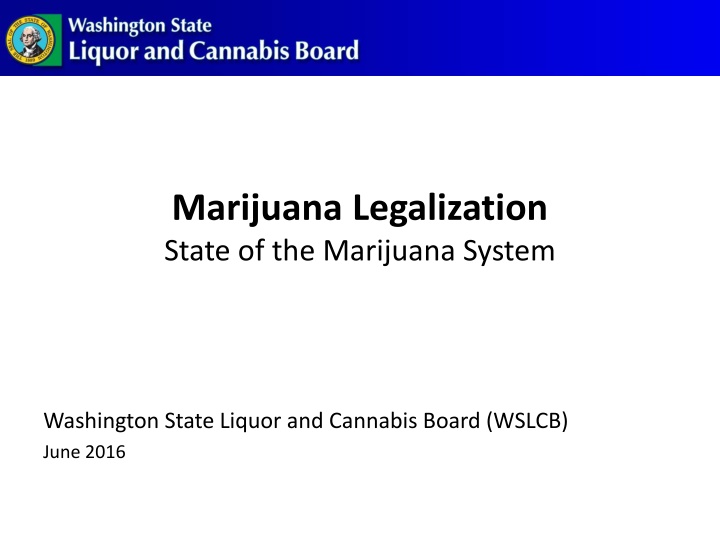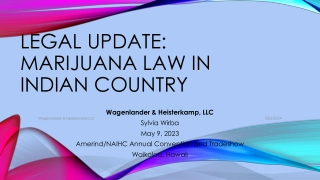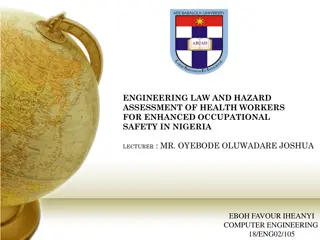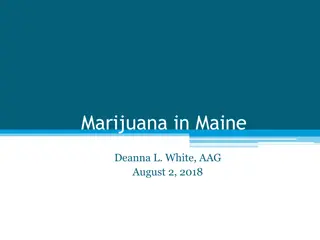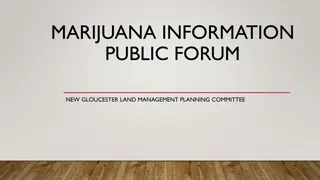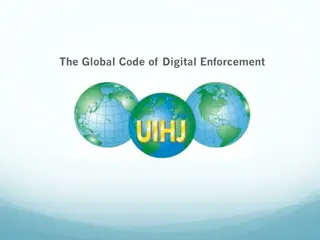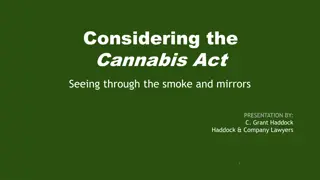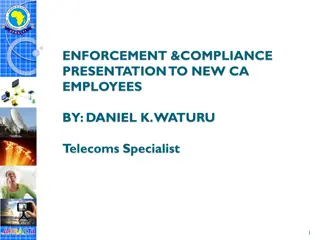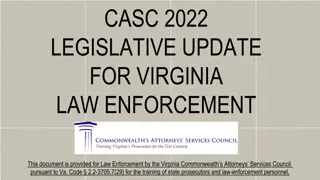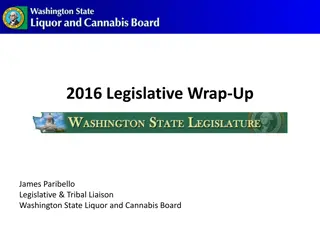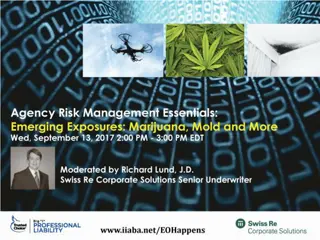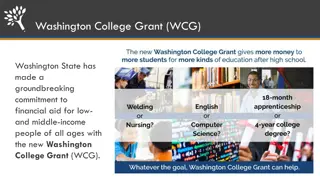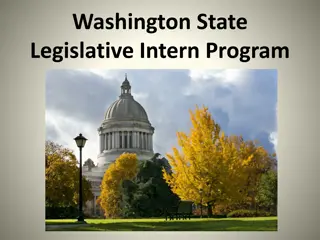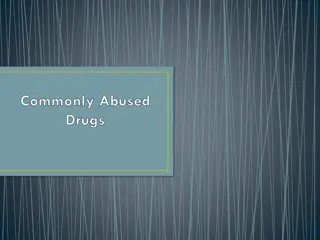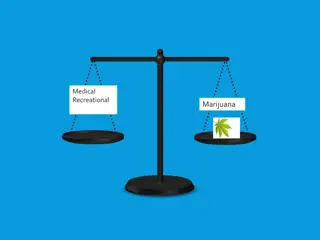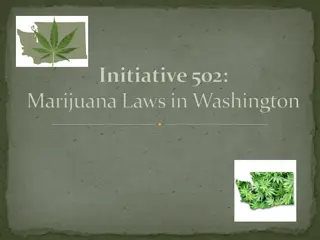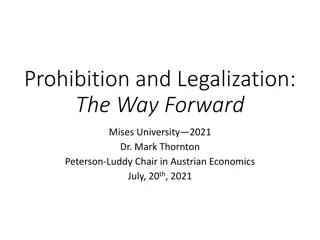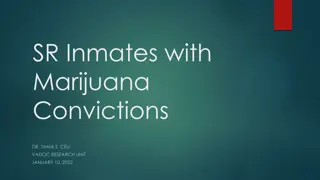Marijuana Legalization in Washington State: Regulations and Enforcement
Washington State's marijuana legalization system, overseen by the Liquor and Cannabis Board, focuses on public safety through tight regulations and federal enforcement guidelines. The state has implemented licensing requirements, including criminal history checks and residency criteria. As of May 2016, a significant number of licenses have been issued for producers, processors, and retailers. Stricter measures are in place to prevent illegal activities and ensure transparency in the marijuana market.
Download Presentation

Please find below an Image/Link to download the presentation.
The content on the website is provided AS IS for your information and personal use only. It may not be sold, licensed, or shared on other websites without obtaining consent from the author.If you encounter any issues during the download, it is possible that the publisher has removed the file from their server.
You are allowed to download the files provided on this website for personal or commercial use, subject to the condition that they are used lawfully. All files are the property of their respective owners.
The content on the website is provided AS IS for your information and personal use only. It may not be sold, licensed, or shared on other websites without obtaining consent from the author.
E N D
Presentation Transcript
Marijuana Legalization State of the Marijuana System Washington State Liquor and Cannabis Board (WSLCB) June 2016
Overview Highlights Agency objective for implementing I-502 Sales activity Issues and challenges Looking Ahead: aligning medical MJ with recreational system Tribal compacts Staying connected 2
Agency Objective Public Safety Create a tightly controlled and regulated marijuana market Agency Role and Responsibilities: Created a 3-tier regulatory system for marijuana Created licenses for producer, processor and retailer Enforcing laws and rules pertaining to licensees Collecting and distributing taxes/fees 3
Federal Enforcement Guidelines In addition to Washington s laws and rules, the Department of Justice issued eight enforcement guidelines for marijuana businesses. These guidelines are separate from Washington s and are enforced at the discretion of the US Department of Justice. Eight Guidelines 1. Preventing distribution to minors. 2. Preventing the revenue from going to criminal enterprises, gangs and cartels. 3. Preventing the diversion of marijuana from states where it is legal to other states. 4. Preventing state-authorized marijuana activity from being used as a cover or pretext for the trafficking of other illegal drugs or other illegal activity. 5. Preventing violence and the use of firearms in the cultivation and distribution of marijuana. 6. Preventing drugged driving and other adverse public health consequences associated with marijuana use. 7. Preventing the growing of marijuana on public lands and the environmental dangers posed by marijuana production on public lands. 8. Preventing marijuana possession or use on federal property. 4
Licensing Requirements Licensing Requirements Criminal history investigation All parties, including spouses FBI background checks Financial background investigation Identifies source of funds Six-month residency requirement Entity must be formed in Washington State Demonstrate at time of application Property must be more than 1,000 from: schools, child care centers, transit centers, game arcades, libraries, playgrounds, public parks. Traceability System A robust and comprehensive software system that traces product from start to sale. Licensees must report significant milestones and changes to the LCB s traceability system which allows the LCB to monitor and track any plant or product at any time. 5
Licenses Issued as of May 31, 2016 Producer/Processor 972 total licenses 724 Producer/Processor 141 Producer only 107 Processor only Retail 365 licenses 297 medical endorsements issued (81 percent) 6
Sales/Tax Activity Sales Activity Total Sales to Date (since July 8, 2014) $1.07 (billion) Total Sales FY 2015: $259.7 million Total Sales FY 2016: $815.0 million Average Daily Sales $3.1 million average daily sales Excise Tax Revenue* Total Tax to Date (since July 8, 2014): $ 229.6 million - Total Excise Tax FY 2015: $64.9 million - Total Excise Tax FY 2016: $155.8 million *In addition, DOR collects Retail Sales and Business and Occupation taxes 8
Revenue Projections Current excise tax forecast projections* (Feb. 2016) Initial excise tax forecast projections (2013) n/a FY 2016 $164.0 million FY 2017 $268.7 million FY 2018 $329.5 million FY 2019 $361.8 million FY 2015 FY 2016 FY 2017 FY 2018 FY 2019 $36.3 million $80.0 million $119.8 million $160.2 million $193.5 million 9
Funding Disbursements Estimated Net to Distribute Agency For Dept. of Social and Health Svcs. substance abuse $155,882,285 FY 16 $12,814,000 (8.2 percent) $260,209,170 FY 17 $27,786,000 (10.7 percent) I-502* 15 percent Prevention and reduction of Dept. of Health Marijuana education and public health program 10 percent $7,500,000 (4.8 percent) $7,500,000 (2.9 percent) University of Washington Research on short- and long-term effects .6 percent $207,000 (.13 percent) $207,000 (.08 percent) Washington State University Research on short- and long-term effects .4 percent $138,000 (.09 percent) $138,000 (.05 percent) Basic Health Trust Fund Account 50 percent $77,941,000 (50 percent) $5,351,000 (3.4 percent) $130,105,000 (50 percent) $12,520,000 (4.8 percent) WA Health Care Authority Contracts with community health centers 5 percent Supt. of Public Instruction General Fund Drop-out prevention .3 percent $251,000 (.16 percent) $51,680,285 (33 percent) $511,000 (.2 percent) $81,442,170 (31 percent) 18.7 percent 10 *Modified by Legislature in 2015, 2E2SSB 2136
Examples of Funded Activities DSHS Substance abuse prevention and treatment Increase in youth treatment services Increased support for and expansion of community- and school-based services Grants for community-based services for prevention Training in Life Skills and other prevention and treatment programs Tribal Prevention and Treatment grants DOH Media-based educational campaigns Parents and other adult influencers Youth Marijuana and Tobacco community grants General population Priority populations (African American, Latino/Hispanic, Asian/Pacific Islander, American Indian/Alaska Native, and LGBQT) Marijuana Hotline Tobacco cessation services 11
Current Challenges Federal Guidelines Doesn t change federal law Focuses on eight points of emphasis including youth access and public safety Banking Dept. of the Treasury allows banks to do business with marijuana licensees Approximately 25 percent of tax paid in cash Budget proviso 2016 Legislature Advertising Balancing free speech with restrictions in the law 15
Current Challenges Bans and Moratoria Court ruled that because I-502 was silent on bans/moratoria that cites/counties can ban marijuana businesses 59 bans statewide 17 moratoria statewide Marijuana Infused Products/Public Safety Board took steps in June 2014 to add additional safeguards to its already comprehensive rules: Emergency Rule: product may not be especially appealing to children Products must be approved by the Board Products must carry an identifier that they contain marijuana Require homogenization to ensure uniform distribution of THC 16
Looking Ahead: Aligning Medical w/ the Recreational System Additional Outlets BOTEC MJ Marketplace: 37% medical, 35% state licensed, 28% illicit Based on BOTEC s comprehensive study of the overall market, the LCB will expand from 334 allotted retail stores to 556 retail stores. We received over 2,300 retail license applications for 222 slots All 222 new stores will be filled by Priority 1 applicants Timeline Sept. 23, 2015 Oct. 12, 2015 Nov. 3-16, 2015 Jan. 6, 2016 March 31, 2016 July 1, 2016 LCB issued emergency and draft rules DOR / LCB begin accepting retail applications Six public hearings statewide Board adopts new cap on retail stores Deadline for retail applications Deadline for unlicensed dispensaries 17
Tribal Compacts September 14, 2015 Suquamish Tribe and Washington State agree to nation s first tribal-state compact. September 23, 2015 Squaxin Tribe and Washington State agree to nation s second tribal-state compact. January 6, 2015 Puyallup Tribe and Washington State agree to nation s third tribal-state compact. Tribes currently entering into negotiations with WSLCB Several tribes are currently pursuing or considering compacts. 18
Future Communications Comprehensive Marijuana website Information regarding July 1, 2016 changes Links to all relevant agency data/info Webinars on relevant topics Quarterly for licensees Expanded access to data Improved graphic display of data 19
Staying Connected Visit the Marijuana 2016 webpage -- lcb.wa.gov Interactive dashboard (maps, relevant data, updated weekly) Factsheets FAQs Timelines Listserv with approximately 13,500 subscribers Public hearings on rules are posted on website and publicized on the listserv Media attention -- AP Top 5 story of 2012, 2013, 2014 20
Thank you 21
